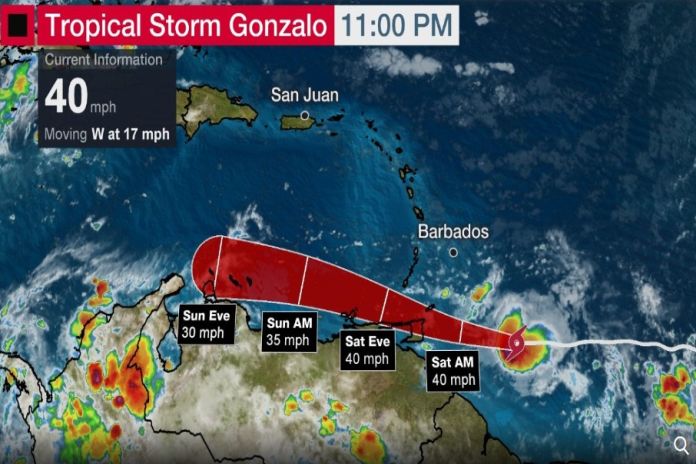Tropical Storm Gonzalo Discussion Number 14 NWS National Hurricane Center Miami FL AL072020 – 1100 PM AST Fri Jul 24 2020
Although there has been a recent increase in deep convection in association with Gonzalo, data from an Air Force Reserve Hurricane Hunter aircraft continues to show that the tropical cyclone is poorly organized. The aircraft has not yet found winds to support tropical storm strength, however the advisory intensity will remain a possibly generous 35-kt until the aircraft completes its mission overnight. There is also some possibility that this recent convective burst could result in some short-term re-organization.
However, with the system losing organization over the past day or so, it is becoming less likely that the small cyclone will be able to significantly recover due to the nearby dry mid-level environment. The updated NHC intensity forecast no longer calls
for any re-strengthening, and Gonzalo could even become a tropical depression before reaching the Windward Islands. After that time, dry air and Gonzalo’s close proximity to the coast of Venezuela are likely to cause the system to weaken and degenerate into a trough of low pressure. The NHC forecast now calls for dissipation by 60 h, but this could occur sooner.
Gonzalo continues moving generally westward or 270/15 kt. The system is not expected to gain much latitude as it should continue moving westward to west-northwestward within the low-level easterly flow. The track guidance continues to trend southward and the NHC track forecast has again been shifted in that direction. The new track lies to the south of the consensus aids, closest to the GFS and UKMET ensemble means.
Key Messages
-
- Gonzalo is forecast to bring tropical storm conditions to a portion of the southern Windward Islands Saturday and Saturday night. Tropical Storm Warnings are currently in effect for some of the islands. Interests in the southern Windward Islands should monitor the progress of Gonzalo and follow any advice given by local officials.
-
- Gonzalo is expected to produce heavy rain over portions of the southern Windward Islands. This could lead to life-threatening flash flooding.
Source: National hurricane center and central pacific hurricane center
Potential Impacts – Updates: The Weather Channel
Gonzalo’s small size also means its areal extent of impacts may be small, so any subtle shift in the track could mean significant changes in impact in the Windward Islands.
The southern Windward Islands should be prepared for a brief round of strong winds, heavy rainfall and rough surf from Gonzalo Saturday.
Flash flooding and mudslides are a concern, particularly over mountainous terrain. Wind gusts may be stronger over higher terrain, as well.
Gonzalo is the earliest seventh named tropical storm on record to form in the Atlantic basin, according to Phil Klotzbach, a tropical scientist at Colorado State University. The previous record was held by Tropical Storm Gert, which developed on July 24, 2005.
Climate change
NEW YORK, USA – The climate emergency generated by global warming is exacerbating existing risks to international peace and security, while also creating new ones, a senior UN official told the Security Council on Friday, making the case for swift climate action on multiple fronts.
“The climate emergency is a danger to peace”, said Miroslav Jenča, the UN assistant secretary-general for Europe, Central Asia and the Americas, as he called on peace and security actors to play their role and help speed up implementation of the landmark Paris Agreement on climate change.
“The failure to consider the growing impacts of climate change will undermine our efforts at conflict prevention, peacemaking and sustaining peace, and risk trapping vulnerable countries in a vicious cycle of climate disaster and conflict”, he said.
Jenča briefed the Council at the start of an open video-teleconference debate on climate and security, one of the key themes of this month’s German presidency of the 15-member body. Noting that the consequences of climate change vary from region to region, he said the fragile or conflict-affected situations around the world are more exposed to – and less able to cope with – the effects of a changing climate.
“It is no coincidence that seven of the ten countries most vulnerable and least prepared to deal with climate change, host a peacekeeping operation or special political mission”, he added. Differences exist between regions, within regions and within communities, with climate-related security risks impacting women, men, girls and boys in different ways, he said.
In the Pacific, rising sea levels and extreme weather events pose a risk to social cohesion, he said. In Central Asia, water stress and reduced access to natural resources can contribute to regional tensions.
Across sub-Saharan Africa, South Asia and Latin America, climate-driven population displacement could undermine regional stability. And in the Horn of Africa and the Middle East, the effects of climate change are already deepening grievances and escalating the risk of conflict – providing fodder for extremist groups.
Outlining some actions that Member States can take together, he said that new technologies must be leveraged to strengthen the ability to turn long-term climate foresight, into actionable, near-term analysis.
Jenča also recommended stronger partnerships that would bring together the efforts already being made by the UN, Member States, regional organizations and others, to identify best practices, strengthen resilience and bolster regional cooperation.





